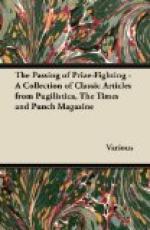Not I, the bard. When delicately
suited
I move again amid the mufti
swarms,
Since trophies from the Front may be disputed,
I’ll flaunt the only spoils that
I have looted,
My little library of Army
forms.
EVOE.
* * * * *
“RANTZAU’S INSOLENT ACT.”
Under this heading The Daily Mail states that before entering the Trianon Palace Hotel to meet the Allies, Count BROCKDORFF-RANTZAU took “a last deliberate puff at his cigarette,” and “dropped it on the steps, in the middle of a group of Allied officials.” We understand that our contemporary feels that it would have been more in keeping with Germany’s political and economic position had the Count humbly extinguished the cigarette and placed it in his waistcoat-pocket for future use.
* * * * *
“Spitable offices will
be placed at the disposal of the German
Peace delegates.”—Evening
Paper.
It is the truest hospitality to make provision for your guests’ peculiarities.
* * * * *
[Illustration: First Reveller. “I SAY, WHAT STUNT IS THIS? A BIRTHDAY OR SOMETHING?”
Second ditto. “DUNNO; FANCY IT’S SOMEBODY’S RAG.”
First ditto. “SHOULDN’T ONE SAY ‘CHEERIO’ TO THE BLIGHTER?”]
* * * * *
OUR BOOKING-OFFICE.
(By Mr. Punch’s Staff of Learned Clerks.)
The Chartered Adventurer (SKEFFINGTON) is what AGNES and EGERTON CASTLE rather pleasantly call their latest hero, Terence O’Flaherty, impecunious gentleman of fortune, lover and general exponent of the picturesque arts of romance. In a special sense indeed, since you have him not only adventuring for fame and fortune, but, as a by-product, turning his exploits into material for a worked-out early-Victorian novelist, whose “ghost” he had, in a more than usually impecunious moment, consented to become. I found this same unfortunate author, gravelled for lack of sensational matter, at once the most entertaining and original figure in the book, whose course is, to tell the truth, marked otherwise by no very conspicuous freshness. The particular adventure to which O’Flaherty and his companion, Lord Marlowe, are here devoted, is concerned with the intrigues of Madame la duchesse DE BERRI on behalf of her son, as de jure King of France, under the title of Charles X. They provide an environment singularly apt for such affairs; the “wild venture” and the abortive, forgotten rising in which it culminated give colour to a multitude of dashing exploits. In themselves, however, these follow what might be called common form, showing the two young men exposed to a sufficiency of danger and exhibiting that blend of folly and gallantry expected of their situation. As to the former quality, when, I wonder, will the heroes of romantic fiction learn that the “pretty youth,” with flashing eyes contradicted by a manner of singular modesty, is really—well, what common folk could have known her for in the first glance? To sum up, I should call The Chartered Adventurer admirable for almost anyone else’s writing, but just a little below the best Castilian standard.




